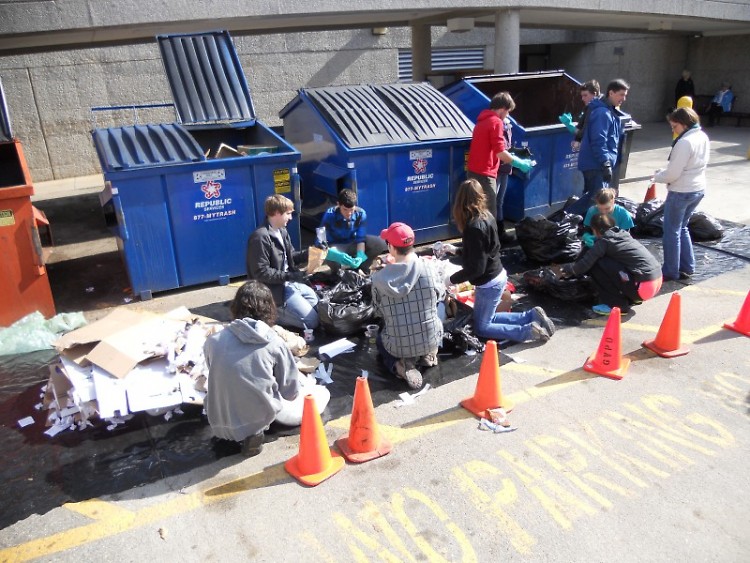In many areas around Grand Valley State University's downtown Grand Rapids campus, along with its campuses in Allendale, Muskegon and Holland, the university has placed composting and recycling bins alongside traditional trash receptacles to cut down on the amount of trash that students and faculty throw away. But members of GVSU’s Student Environmental Coalition think that these alternative forms of trash disposal are being under-utilized.
That’s why last Monday, February 20, GVSUSEC volunteers held a public waste audit to raise awareness about the amount of trash that gets “landfilled” rather than diverted to colleges composting or recycling programs.
“We already have compost bins and recycling in every dining hall, so it should, in theory, be easy for people to recycle and compost. However, this isn't happening as much as it could be if people thought a little more about what they throw away,” said senior Josh Lycka.
To prove their point, students sorted garbage from a dumpster at one of the campus’ main dining halls. According to GVSU Campus Sustainability Manager Bart Bartels, 80% of the garbage found in the dumpster could have been diverted into either a recycling or a composting bin.
Although the sample size from Monday’s waste audit is statistically insignificant, it confirms what GVSUSEC members originally suspected about the university’s overall attitude toward campus recycling and composting programs.
“Information collected from the first audit was quite telling. About 80% of the dumpster's content could have been diverted to recycling or composting. I think it shows us how much farther we have to go. While we are doing a good job of recycling, the bar needs to be raised. We are now discussing ways to increase the diversion rate, plan implementation, and a second waste audit for evaluation,” Bartels wrote in an email after Monday’s event.
On the flip side, the audit illustrates a growing enthusiasm among students to create a more sustainable environment on campus. According to data published by GVSU’s Facilities Department, the college has a current diversion rate of 42%, meaning that 42% of all trash on campus gets recycled or composted instead of going to a landfill. This is almost double the university’s diversion rate less than a decade ago. GVSUSEC volunteers hope that Monday’s waste audit will encourage others to take steps to minimize the university’s waste stream and spur even more activism among students.
“We have such a good system set up for composting and recycling, but very few people actually use it,” said GVSUSEC member Kirk Barber.
Last fall the SEC established a recycling program at GVSU football games and members have been actively campaigning to stop the sale of bottled water on campus – they have received several grants from the college to install water bottle filling stations.
GVSUSEC students had the idea to conduct the waste audit after their counterparts at the Meijer Campus in Holland held a waste audit last fall. The waste audit last Monday was billed as a part of the GVSU’s involvement in Recyclemania – a national intercollegiate competition to promote waste reduction on college campuses.
The Rapidian, a program of the 501(c)3 nonprofit Community Media Center, relies on the community’s support to help cover the cost of training reporters and publishing content.
We need your help.
If each of our readers and content creators who values this community platform help support its creation and maintenance, The Rapidian can continue to educate and facilitate a conversation around issues for years to come.
Please support The Rapidian and make a contribution today.



